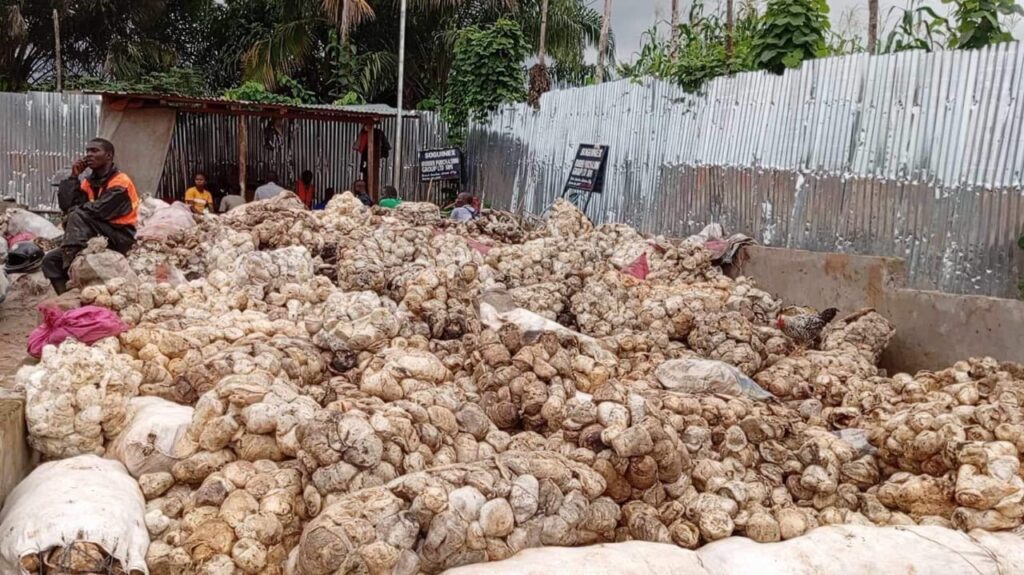
Ganta, Nimba County — A growing number of residents in Wuo’s Town, Ganta, Nimba County, are raising alarms about the operations of the SOGUINEX Rubber Purchasing Group. They allege that the company’s activities, particularly the absence of adequate sanitation measures, are adversely impacting their health and livestock.
The residents have reported increased air pollution due to rubber odors, a spike in mosquito populations, and a rise in illnesses among children. The SOGUINEX Rubber Purchasing Group is accused of exacerbating poor sanitation conditions, leading to various health problems for nearby communities.
In an interview on September 5, 2024, Vera Saye, a concerned resident, painted a grim picture of the situation. “The rubber company that people brought here can affect us. When it rains, children play in the dirty water. This leads to sores on their feet, making them sick and increasing mosquitoes,” she said. Saye also mentioned that another local resident reported losing chickens after they fed near the company’s operations.
Saye and her neighbors are urging authorities to relocate the rubber buying facility farther away from their community to mitigate further harm.
Similarly, G. Cyruson Yeanay, who also lives in the area, expressed dissatisfaction about the lack of consultation prior to SOGUINEX’s establishment. He reported that many of his chickens died after grazing near the facility, yet no remedial action has been undertaken.
Another resident, Saye Kokeh, added that they had voiced several complaints to the community’s zone leader, but so far, no solutions have been found. There are suspicions that the zone leader may have ties with the rubber company, hindering an effective intervention.
The concerns are echoed among other residents of Kpelleh Village, Peace Avenue, and the Royal community, who are also facing increased mosquito infestations. Alex Donkia, a resident of the Royal community, expressed his frustrations. In an interview on September 19, 2024, he described the situation as embarrassing for his family: “The mosquitoes are unbearable. The company needs to fence and spray the operation site to improve the situation for us.” Donkiaemphasized the dangers of the company’s operations, noting, “They are using acid in the area, and there is a creek nearby that other people use. They need to secure and maintain the site.”
Junior Guanue, another local resident, confirmed the mosquito issue, stating that the discomfort has forced his family to go to bed early.
While there is no comprehensive statistical data directly correlating rubber-buying companies with a rise in mosquito populations, studies suggest improper water management associated with rubber operations can enhance mosquito breeding habitats.
Defending the company’s presence, Wuo P. Konah, leader of Ganta Zone #6, contended that SOGUINEX benefits local rubber farmers in nearby areas. Although he acknowledged receiving complaints from community members, he did not outline specific steps taken to address their concerns, urging locals to consider the benefits that the company has brought to rubber farmers.
Local farmers, who previously struggled with transporting their rubber products to Firestone, have found relief since the establishment of the SOGUINEX facility.
Nyah Mietakor, a local rubber farmer from Garr Gbeisella town, explained, “I used to suffer to get money quickly because of transportation issues when taking my rubber products to Margibi, and some of the rubber-buying factories in Nimba were too far for me. It even affected my monthly susu payments. But since this new facility opened, they’ve been helping us buy our rubber at a good price.”
Melewon P. Daysee, manager of SOGUINEX, rejected the allegations from residents as misleading. He insisted that the rubber purchasing group operates legally on private land. He said the company is registered with the Liberian government and pays taxes without engaging directly with community members. Daysee mentioned that the company has initiated measures for environmental management, including the construction of a septic tank and waste control facility, and implementing chlorination, though he did not address concerns regarding local or underground water sources.
Ganta Mayor Samuel Hardt expressed frustration regarding the situation, noting that the agreements regarding the company’s establishment were made between landowners and the company, limiting the city’s influence. Hardt, who previously identified sanitation, water, and hygiene as key priorities, intends to involve the Environmental Protection Agency (EPA) in addressing these issues and collaborating with relevant partners to mitigate sanitation concerns in Ganta.
Kingston G. David, the EPA representative for NimbaCounty, confirmed that the agency had already issued warnings to SOGUINEX in response to complaints. David stated that the EPA had recommended best practices and mechanisms in line with international standards for rubber operations within urban settings.
The agency has confirmed reports of negative health impacts associated with rubber factories, which prompted their intervention. “We received a complaint from an anonymous elderly man. He showed our inspectors two dead chickens and a sick duck. While we didn’t see directly affected individuals, the water coming from the factory’s fence was contaminated with acid and other harmful substances that could cause illness. The environment was also highly polluted, suggesting that without proper sanitation measures, mosquito populations would increase,” David explained.
The World Health Organization (WHO) highlights the importance of sanitation and hygiene to public health; an estimated 1.4 million people die annually due to inadequate sanitation and hygiene practices.
In a separate context, Liberia’s President, Joseph Boakai, has made sanitation a central concern in his administration, reiterating this commitment during his State of the Nation address, as outlined in the government’s “ARREST” agenda. A clean environment is critical for enhancing health, supporting livelihoods, and fostering a healthy community.
